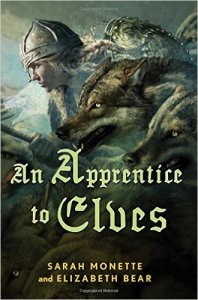Faren Miller reviews Sarah Monette & Elizabeth Bear
An Apprentice to Elves, Sarah Monette & Elizabeth Bear (Tor 978-0-7653-2471-9, $26.99, 336pp, hc) October 2015.
 All three books of the Iskryne trilogy by Sarah Monette and Elizabeth Bear can make the reader feel the mixed emotions (frustration, challenge, exhaustion, delight) of a foster child being tutored in strange crafts a long way from home: someone like Alfgyfa, whose story dominates final volume An Apprentice to Elves. The mixture of Nordic and nonhuman cultures, complicated names, alternate history, and unusual forms of magic introduced in Books One and Two (A Companion to Wolves and The Tempering of Men) helped shape the seven-year-old girl who grew up in a township of warriors, driven from their original homes by something like an invading Roman army, but keeping their bonds with both sentient wolves and a little group of alfar – elvish – exiles heretical enough to trade openly with men.
All three books of the Iskryne trilogy by Sarah Monette and Elizabeth Bear can make the reader feel the mixed emotions (frustration, challenge, exhaustion, delight) of a foster child being tutored in strange crafts a long way from home: someone like Alfgyfa, whose story dominates final volume An Apprentice to Elves. The mixture of Nordic and nonhuman cultures, complicated names, alternate history, and unusual forms of magic introduced in Books One and Two (A Companion to Wolves and The Tempering of Men) helped shape the seven-year-old girl who grew up in a township of warriors, driven from their original homes by something like an invading Roman army, but keeping their bonds with both sentient wolves and a little group of alfar – elvish – exiles heretical enough to trade openly with men.
Though the much larger community of svartalfar to the north is hidebound and insular, practicing their ancient rituals and traditional crafts of stone- and metal-work over the course of extended lives in cave systems where they can avoid the dire effects of sunlight on alvar flesh, a few are curious about these short-lived humans. Master smith Tin is unconventional (mad, she sometimes wonders) enough to take on Alfgyfa as a fosterling/apprentice – and keep her, after the fractious child in the Prologue, homesick primarily for wolves, enters a forbidden zone to save a half-grown cub.
Even for old-school alfar, magic doesn’t resemble wizardry or alchemy. By the age of 15 (an adult by human reckoning, as she keeps telling herself), Alfgyfa has learned to temper metal with her own hands, and feels the joy of the craft. When something like a diplomatic mission brings her to the isolated enclave of exiles where she renews ties with childhood friend Osmium, the ‘‘heretic’’ stonework that seems so natural to her (unlike the bizarre work of trolls) may strike us as more like ultramodern tech:
Osmium lived high above the city. Her door was a wonderful ochre orange that reminded Alfgyfa of autumn and butterfly wings. Osmium opened it not with a key but with a stroke of her fingers…. The door swung wide as silently and smoothly as if it were a living limb, not a construct on hinges.
While the threat of renewed war with foreign armies looms throughout this book, much as it does in Johansen’s, Apprentice places a special emphasis on the strange and fascinating cultures, crafts, and languages of locals. Driven by a mixture of circumstance, stubbornness, and insatiable curiosity, Alfgyfa manages to communicate with both sentient wolves and alfar from an ancient civilization far more sophisticated than her own – despite blunted, merely-human senses that struggle to translate wolvish into words, and vocal cords inadequate to the multiple tones of alfar speech.
Young and with no predestined role to play in politics, battle, or the use of otherworldly powers, Alfgyfa brings this trilogy to an ultimately satisfying conclusion without extravagant heroics. If you find her world as interesting as I do, that shouldn’t bother you at all!







